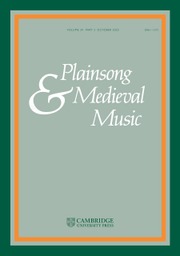No CrossRef data available.
Article contents
Recordings of non-Western chant and polyphony
Published online by Cambridge University Press: 13 November 2000
Abstract
Chant from the Greek tradition continues to be explored in its various manifestations by performers with very different interpretational approaches. Lycourgos Angelopoulos has continued his pioneering work both liturgically and in concert, though he has not recorded a great deal recently. His two most recent discs, which fill significant gaps in the recorded repertory, date from 1993 and 1994. The first (5) is a concert recorded in 1990, particularly interesting in that it contains two pieces from the Athonite tradition as practised today: the mode 1 kathisma from the Akathistos Hymn as notated by Fr Georgios Rigas (d. 1958) and verses from Psalm 135 in four modes as sung by the much beloved Deacon Dionysios Firfiris, proptopsaltis of the cathedral of Karies on Athos until his death in 1990. The psalm verses are sung in Angelopoulos's own transcription. The second disc (7) brings together a collection of magnificent seventeenth- and eighteenth-century compositions for Christmas. It includes a particularly impressively structured koinonikon by the Constantinopolitan Daniel Protopsaltis (d. 1789), which includes a fine kratima (a melody sung to nonsense syllables) before the final alleluia. The performance style of the Greek Byzantine Choir is, as ever, tasteful, technically brilliant (the precision of the ornamentation alone leaves one amazed) and inspired. Worthy of emphasis is the fact that this repertory is being sung by a choir. Choral (as opposed to solo) psaltic singing is undergoing something of a revival in Greece at present. A number of good choirs are working in the field, but the Greek Byzantine Choir remains the only one to have been extensively recorded and distributed outside Greece.
- Type
- Research Article
- Information
- Copyright
- © 2000 Cambridge University Press




